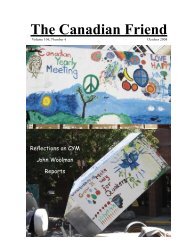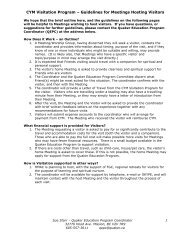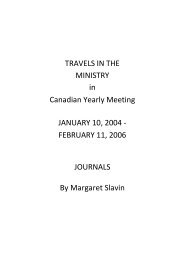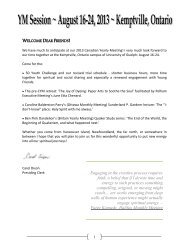Download pdf - Canadian Yearly Meeting
Download pdf - Canadian Yearly Meeting
Download pdf - Canadian Yearly Meeting
Create successful ePaper yourself
Turn your PDF publications into a flip-book with our unique Google optimized e-Paper software.
Are Quakers Christian?Maxine Kaufman-LacustaShort answer: This one isn’t. On the other hand,Quaker roots are unquestionably Christian, even ifthis was the radical Christianity of George Fox, whorejected the preachers and those he called ‘professors’,in his day. Fox looked within for his “inner teacher” orinner Light, which he undoubtedly perceived as beinga manifestation of “Christ Jesus, come to teach Hispeople Himself”. This is an interpretation that earlyFriends, and probably many today, would accept. Butthose of us from non-Christian backgrounds, or thosewho have rejected Christianity for whatever reasons,would use different terminology from Fox to describethe same sense of being in touch with that of G-d orthe divine within ourselves and others.I’ve been attending Quaker <strong>Meeting</strong>s since 1963.For many years I felt quite isolated as a non-Christianin general, and specifically as a Jew among mainlyChristian (Christ-centered) Friends. What was I doinghere if I weren’t a Christian?For example, when I first heard the song Lord ofthe Dance in 1971, I was shocked by some of the lyrics,especially the second verse, which begins: I danced forthe scribe and the Pharisee, but they would not danceand they wouldn’t follow me...”How could Quakers, I wondered, joyouslysing words that repeated what for me amountedto confirmation of the Christ-killer label that hasbeen used as a pretext for the murder of my peoplethroughout the ages? The Pharisees are widelyconsidered to be the spiritual forebears of “normativeJudaism”. Friends whom I asked about this assured methat no harm was meant.More recently, this discussion surfaced again andthree of us, as well as a non-Jewish Quaker who sharedour concern, decided to go public. We put togetheran article that was accepted for publication in FriendsJournal and appeared in the April 2010 issue: Singing‘Lord of the Dance’: Reflections on Anti-Semitism andLoving One Another. I think the publication of thisarticle reflects a really big change over the past fewyears. As a non–Christian–Jewish–Friend, I haveexperienced growing support and understanding. Ihave come to know that I am no longer so isolated.In 1975, after twelve years of attending variousFriends <strong>Meeting</strong>s in the UK and Canada, and afterattending two sessions of CYM – where the experienceof Quaker decision-making process is particularlyintense – I began to seriously contemplate joiningthe Society of Friends. Then at CYM the followingyear, I encountered one of those triggering comments.A woman in my worship-sharing group said: “Thereare many paths to the top of the mountain, and theQuaker way is a Christian way”.I had been feeling at last, that my spiritual homewas with Quakers, and now I was hit with this! “Isthere really a place for me here, after all?” I wonderedaloud. [A Friend] suggested I hold a special interestgroup (SIG) on this issue. Surprisingly, about twentyfiveFriends of all ages and stripes showed up for a SIGentitled Is there a place for non-Christian Quakers? Thenext year I was invited to do a follow-up SIG titledUnity and Diversity: Christian and Non-ChristianFriends. [See page 23].So what does being a Quaker mean to me as anon-Christian, as a Jew? It means that my focus ison my conviction that there is that of the divine inevery person, and that I try to act on that conviction.My relationship with what I refer to as “G–d”, callsme to listen for leadings, to try to be in touch withwhat guidance might come my way from this Light,showing me where I need to go. I also regard thehistoric Quaker testimonies of Simplicity, Peace,Integrity, Community, and Equality, and newer onesto do with ecology, as arising from this conviction. Inother words, not all that different from Friends whoare Christian. After all, my Jewish mother did refer toJesus as a great teacher, and that seems to make senseto me. I just don’t see him as a deity figure.Yes, I do maintain a connection with my Jewishroots. I even attend synagogue from time–to–time(though the way I experience God, the divine in thatcontext is very different), and even after forty–sevenyears among Friends, many of my ways of looking atlife have Jewish roots. But in my relationship to God,I ultimately return to <strong>Meeting</strong> for the sense of directconnection, and communication with the Spirit, thatI feel in the company of Friends.Maxine Kaufman-LacustaVancouver Monthly <strong>Meeting</strong>Volume 109, Number 2 25








